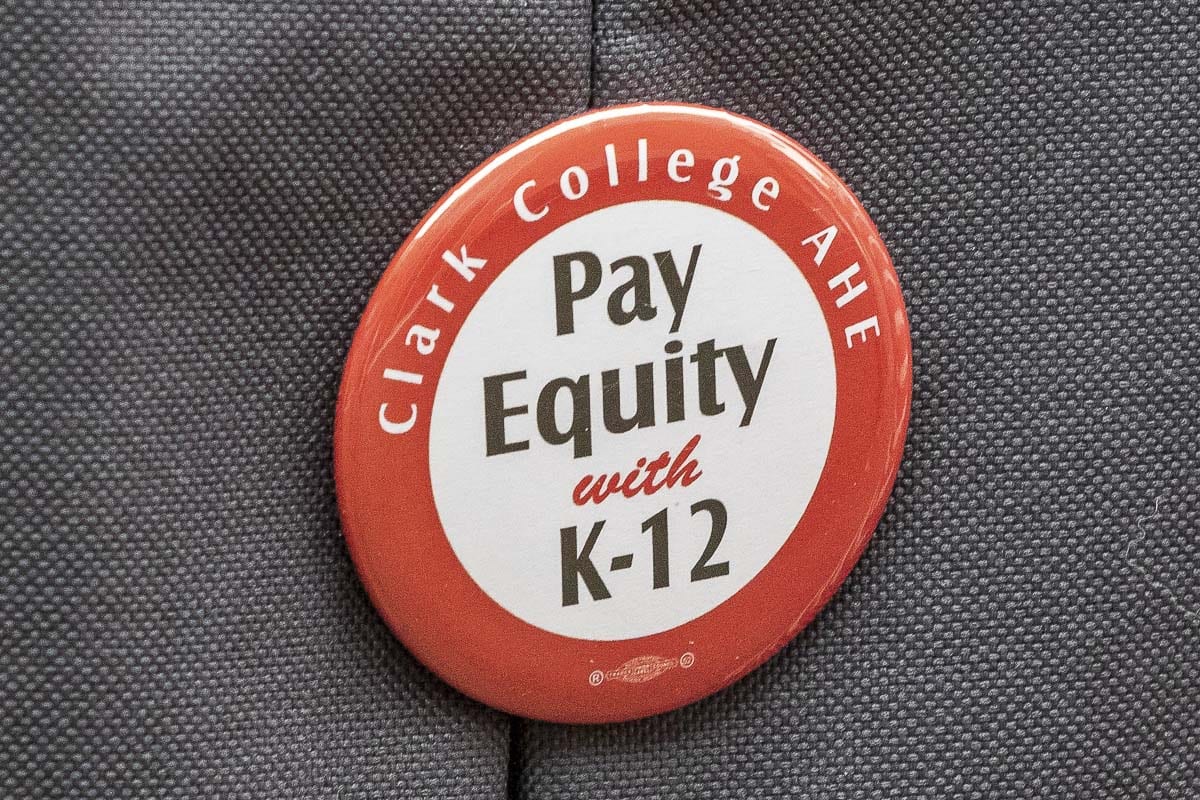The strike would only be the second in state history for a two-year college
CLARK COUNTY — Negotiations continue, but if no deal is reached this week, classes at Clark College could be canceled due to a faculty strike for the first time in its history on Monday, Jan. 13.

In December, members of the Clark College Association for Higher Education (CCAHE) voted unanimously to authorize faculty leadership to approve a strike if a deal hadn’t been reached by the end of the holiday break.
In a news release on Jan. 2, CCAHE and the Washington Education Association (WEA) said that a counter-proposal to a Dec. 27 offer from the college went without response.
“After we waited all day, the college administration had nothing new to offer,” said Suzanne Southerland, union president. “That was disappointing. The students and faculty of Clark College deserve better.”
In 2018, the state authorized community college faculty the right to negotiate raises beyond the state-funded cost of living increases, though no additional state funding was provided.
Clark College currently has an operating budget of $73.2 million, 86-percent of which is dedicated to employee salaries and benefits, according to an FAQ posted on the college’s website.
The college argues tuition revenue fell nearly $400,000 last year, owing to a seventh consecutive year of enrollment declines. They argue that during that same period they have experienced increases in operational expenses, such as Classified staff increments, tenure promotions, and increases in the cost of healthcare and retirement benefits.
“The College really wants to reach a settlement,” said spokesperson Kelly Love. “This is our faculty. We have a strong affinity for our faculty. And we have a partnership. And so we want to make sure that we’re doing everything we can to get to that settlement.”

CCAHE officials argue that full-time faculty have been slashed from 230 in 2017-2018 to 188 currently, while part-time faculty have increased from 245 to 363 positions.
The college says the faculty numbers used by the union are pulled from a one-day count done during the fall term, and then compared against full-year numbers. Their year-over-year faculty counts show a reduction of only four percent for both full and part-time staff in the past four years, which would be in line with the reduction in enrollment over that period. Their year-over-year numbers show a high of 204 full-time faculty in 2016, compared to 188 in 2018 (the last year final numbers are available). Part-time faculty declined from 379 in 2017, to 363 the following year.
The union’s other argument revolves around spending in other areas. For instance, they point out that compensation for now-retired college president Bob Knight increased by 20 percent over the past five years, while faculty salaries only kept pace with inflation.
“When it comes to the success of our students, what is more important than having qualified, committed, caring faculty?” their website reads. “Quality faculty should be the top budget priority.”
The same website notes that top-end pay at Clark College is just over $76,000, compared to more than $90,000 at nearby Portland Community College or nearly $95,000 at Mt. Hood Community College.
The union also points to K-12 labor negotiations last year that netted teachers, in many cases, double-digit percentage salary increases, leaving higher education professionals further behind and potentially causing an exodus from Clark College.
CCAHE’s proposal has been to increase full-time pay, and link part-time pay to a percentage of what full-time staff make (their proposal has been 75 percent of full-time pay, with a goal to eventually reach 80 percent.
On Dec. 27 the school, at the direction of the board, raised its current best offer to one of two options:
Option A
Full time: one percent permanent salary increase from local funds retroactive for 2018-2019 and four percent permanent salary increase from local funds for the 2019-2020 year.
Part time: Implementation of locally funded adjunct parity proposal at 73 percent for Associates, 73 percent for Affiliates and 70 percent for Adjuncts over a five year period in equal steps starting July 1, 2019. No part time faculty salaries would be reduced as a result of the implementation plan.
Option B
Full time: one percent permanent salary increase using local funds for 2018-2019 and four percent permanent salary increase from 2019-2020.
Part time: six percent permanent salary increase from local funds for 2019-2020.
CCAHE calls the administration’s proposal “far short of what’s needed to continue attracting and keeping qualified, committed faculty for Clark College students.”
Love says both sides are committed to continue negotiations through this week, and into the weekend. If a deal isn’t reached by 5 p.m. on Friday, the union would likely authorize a strike, and it’s possible classes could be canceled on Monday.
The only remaining issues surround compensation. Both sides have reached tentative agreement on a list of non-compensation issues, including:
- $500 one-time stipend for full- and part-time faculty who attain a Clark College E-Learning Certificate
- Ensuring appropriate compensation for year-round programs
- Clarifying and improving the tenure process, including increased support for Probationers
- Increasing Full Professor positions from 15 to 18 and clarifying the work expectations
- Identifying ASCC Program Directors as AHE Bargaining Unit Members and clarifying the hiring procedures
- All academic employees at the college will now hold the academic rank of Professor
- An annual $500 Vocational Stipend for Associate Adjuncts
- An annual $900 Earned Doctorate Stipend for Associate Adjuncts
- Withholding of Paid Family Medical Leave premiums
No college in Southwest Washington has ever experienced a strike in state history. Bellingham Technical College went on strike for several days in 2013.
According to state law (RCW 28B.52.078), it is illegal for state employees to engage in a strike.
“Should either a strike or lockout occur, the representative of the faculty or board of trustees may invoke the jurisdiction of the superior court in the county in which the labor dispute exists and such court shall have jurisdiction to issue an appropriate order against either or both parties,” the law reads.
Battle Ground School District won an injunction against its teachers after they went on strike last year, though a deal was reached before the injunction could be enforced. At this point Clark College says no decision has been made in regard to seeking legal action to stop a strike.
“If there’s a strike on Monday, then the college will make some of those decisions,” says Love. “With the goal being ‘let’s get back to the table.’”
Beginning next week, the college is hosting its four finalists to take over the job of president. One, Dr. Sara Thompson Tweedy, the vice president of student access, involvement, and success at SUNY Westchester Community College in New York, set to visit on Jan. 14.
Whichever candidate wins the job may not have to negotiate this salary dispute, but they won’t get to rest for long. Negotiations for the next contract will begin in May of this year.




